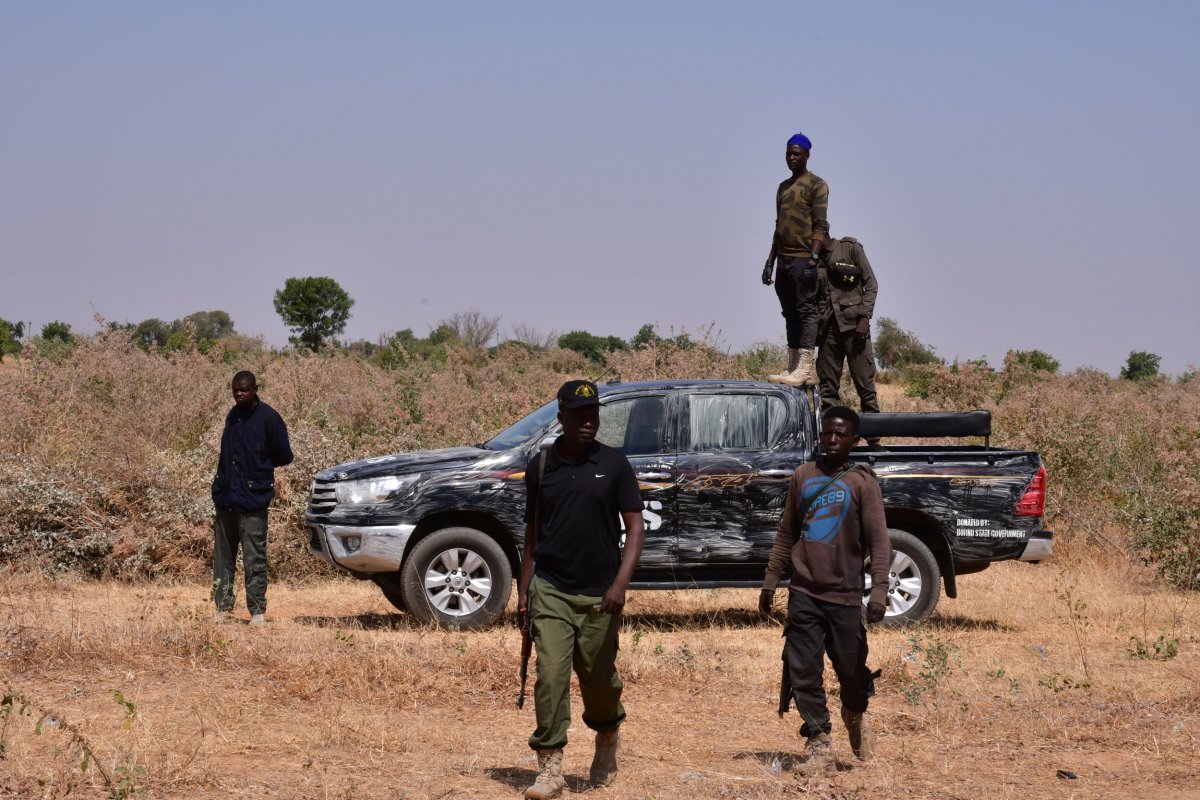On March 11 of 2018, Veronica John, 35 years old, heard a barrage of gunshots when Fulani herdsmen surrounded her village in Kaduna state, in central Nigeria. Veronica tied her two-year-old daughter on her back and ran.
"I didn't know which direction to go and wound up running straight into a group of the attackers," she told me afterward. One of them tried to yank the little girl off her mother's back.
"Please don't kill my child," she begged. The girl pleaded, "Please don't kill me."
"We will leave her if she eats her mother's finger," one of them jeered.
"He yanked my arm, chopped off my index finger with his machete, and pushed it into my daughter's mouth," Veronica told me tearfully.
Veronica's daughter could not eat it, so he sliced both the girl and her mother with his machete.
The two-year-old girl was killed, and her mother passed out.
When Veronica woke up later in a pool of blood, she saw her daughter's hacked body lying on the ground. A severed finger was stuck in her mouth.
The central region of Nigeria has been trapped in a slow-motion genocide for over a decade now. More than 35,000 Christians have been massacred. Whole villages have been exterminated. Thirteen thousand churches and 1,500 Christian schools have been destroyed. More than two million have been displaced from their homes, and 304,000 are refugees. According to the International Red Cross, by September of last year 23,000 had gone missing.
Fulani attacks on Christians have all the trademarks of a genocide, which the United Nations defined as "an intentional effort to completely or partially destroy a group based on its nationality, ethnicity, race or religion."
The Fulani are cattle herdsmen working with Boko Haram, a radical Islamist group intent on ridding Nigeria of Christians. As Nina Shea at the Hudson Institute has reported, "During many of the attacks, herders are reported by survivors to have shouted 'Allah u Akbar,' 'destroy the infidels' and 'wipe out the infidels.'"

The Muslim-controlled government of Nigeria denies allegations of genocide. It dismissed the massacres as "clashes between farmers and herders," suggesting that both sides are aggressive and prepared to fight. But while the Fulani always come with machetes and expensive guns and target only Christian farmers, their victims have been unarmed. The tens of thousands of men, women and children now lying in mass graves across central Nigeria could barely afford one meal a day, much less $1,200 to buy an AK47, the weapon favored by the Fulani.
Contrary to the government's narrative that the Fulani killings are "random," the strategic planning and execution required for the attacks have prompted former high-ranking military officers and members of the Nigerian Senate, Jonah Jang and David Mark, to call it a genocide. When 500 Christian villagers were gunned down at Agatu, Mr. Mark said the attacks "bore the markings of a planned and orchestrated genocide." Former defense minister T.Y. Danjuma has called the killings "ethnic cleansing," and exhorts Christians to defend themselves: "If you depend on the armed forces to protect you, you will all die."
In 2018 the Nigerian House of Representatives declared the killings in Christian villages in Plateau state a "genocide."
Islamists are careful not to attract international outrage, so they spread the attacks out over time. Villages are attacked and people killed in one area, and then there is a pause. Then another group of villages is attacked with dozens more killed. A week later, more Christian villages are destroyed with hundreds massacred. When all the Christians are killed in a village, the Fulani replace its original name with another in Arabic.
Kidnapping and rape have been added to the deadly brew. Villagers and their impoverished churches are forced to pay the Fulani for the lives of their family members. A popular Muslim cleric, Sheikh Ahmad Gumi, in a recorded meeting with leaders of the Fulani militia, assured the kidnappers their demands would be met.
These are some of the reasons the U.K.'s All-Party Parliamentary Group for International Freedom of Religion has decried the "unfolding genocide" in central Nigeria.
Distracted in the last 18 months by the COVID-19 pandemic, the West has ignored this genocide. It has been convenient to trust the Nigerian government's denials of any connection between the Fulani attackers and Boko Haram, which the United States has condemned as a terrorist organization. This despite former Nigerian director of defense information Major General Chris Olukolade's declaration that the Fulani are carrying out Boko Haram directives. And, as the governor of Niger state recently pointed out, Boko Haram has been planting its flag in central Nigeria.
Ignoring this genocide could hurt the West in a big way. While the Biden administration seeks to wean the United States from fossil fuels, civil war in Nigeria could lead to sharply higher prices at the pump while the U.S. is still a long way from having reliable alternatives. And unless world leaders hold the Nigerian government accountable, fallout from the current anarchy could send new waves of immigrants to Western nations already divided over how and whether to receive them.
Like Sudan, Nigeria is dangerously at the brink of breakup, and this new conflict between Christians and radical Islamists could be the straw that breaks the camel's back.
Hassan John is an Anglican priest and journalist in Jos, Nigeria.
The views expressed in this article are the writer's own.
Uncommon Knowledge
Newsweek is committed to challenging conventional wisdom and finding connections in the search for common ground.
Newsweek is committed to challenging conventional wisdom and finding connections in the search for common ground.
About the writer
To read how Newsweek uses AI as a newsroom tool, Click here.








